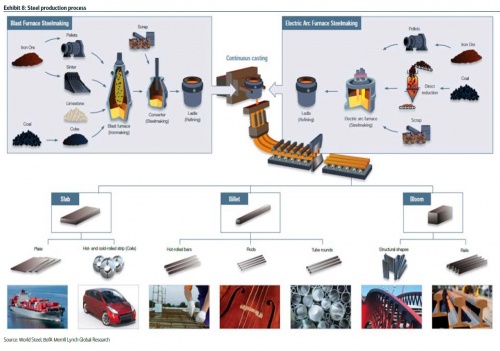Steel Production: Difference between revisions
Jump to navigation
Jump to search
| (11 intermediate revisions by the same user not shown) | |||
| Line 6: | Line 6: | ||
*Recycling of steel from scrap at 1kWhr/kg | *Recycling of steel from scrap at 1kWhr/kg | ||
energy input. See [[Solar Steel]]. | energy input. See [[Solar Steel]]. | ||
*Another route is reduction of ore using hydrogen. | *Another route is reduction of ore using hydrogen. See [[Hydrogen Reduction Smelting]] | ||
*OSE's case would be to produce steel from direct reduction, which is more efficient and lower temperature than a blast furnace. https://en.wikipedia.org/wiki/Direct_reduced_iron | *OSE's case would be to produce steel from direct reduction, which is more efficient and lower temperature than a blast furnace. https://en.wikipedia.org/wiki/Direct_reduced_iron | ||
*Iron mining in the USA - [https://en.wikipedia.org/wiki/Iron_mining_in_the_United_States] | *Iron mining in the USA - [https://en.wikipedia.org/wiki/Iron_mining_in_the_United_States] | ||
*Chromium mining (for stainless steel) - Chromite (FeCrO) is reduced to Ferrochrome (FeCr) via carbothermic reduction. Chromite in Oregon, Montana, California - [https://oregonencyclopedia.org/articles/chromite_mining/#.Xo6DuJ-YU5k] | *Chromium mining (for stainless steel) - Chromite (FeCrO) is reduced to Ferrochrome (FeCr) via carbothermic reduction. Chromite in Oregon, Montana, California - [https://oregonencyclopedia.org/articles/chromite_mining/#.Xo6DuJ-YU5k] | ||
=Distributed Market Substitution Calculations= | |||
*Global production is 2 billion tons [https://worldsteel.org/media-centre/press-releases/2023/december-2022-crude-steel-production-and-2022-global-totals/#:~:text=Total%20world%20crude%20steel%20production%20was%201%2C878.5%20Mt%20in%202022,annual%20production%20totals%20by%20country.] | |||
*[[Farm Yields Per Acre]] shows about 1000 tons per year per acre yields of recycled steel. This means we need '''square mile scale solar operations per million tons (Mt)''', and 2000 of these worldwide. | |||
*About 2000 square miles displaces all of global production. That is 2000 farms. Only 2M acres. This is the size of the [[Largest Landowners]] | |||
*40% global steel production is from recycled sources | |||
=OSE Workflow= | =OSE Workflow= | ||
Latest revision as of 16:16, 21 August 2023
https://edge.alluremedia.com.au/uploads/businessinsider/2017/11/iron-ore-steel.jpg
OSE Case
- Recycling of steel from scrap at 1kWhr/kg
energy input. See Solar Steel.
- Another route is reduction of ore using hydrogen. See Hydrogen Reduction Smelting
- OSE's case would be to produce steel from direct reduction, which is more efficient and lower temperature than a blast furnace. https://en.wikipedia.org/wiki/Direct_reduced_iron
- Iron mining in the USA - [1]
- Chromium mining (for stainless steel) - Chromite (FeCrO) is reduced to Ferrochrome (FeCr) via carbothermic reduction. Chromite in Oregon, Montana, California - [2]
Distributed Market Substitution Calculations
- Global production is 2 billion tons [3]
- Farm Yields Per Acre shows about 1000 tons per year per acre yields of recycled steel. This means we need square mile scale solar operations per million tons (Mt), and 2000 of these worldwide.
- About 2000 square miles displaces all of global production. That is 2000 farms. Only 2M acres. This is the size of the Largest Landowners
- 40% global steel production is from recycled sources
OSE Workflow
Sourcing
- Recycling
- Ore?
Refining
- Froth Floatation and other ore methods?
- Direct Reduction , and Charcoal Blast Furnace
